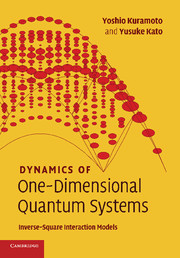7 - Jack polynomials
from Part II - Mathematics related to 1/r2 systems
Published online by Cambridge University Press: 12 January 2010
Summary
In this chapter, we discuss the mathematical properties of Jack polynomials. Since the content is a little intricate, we first explain the scope of the chapter, and the relationship between different kinds of Jack polynomials.
In deriving dynamics of the single-component Sutherland model, the symmetric Jack polynomial Jk(z) plays a fundamental role since each eigenfunction is a product of a Jack polynomial and a power of the Vandermonde determinant. Here z = (z1, …, zN) represent complex coordinates, and k is a partition specifying a set of momenta for particles. The product of a Vandermonde determinant Δ(z) and a Jack polynomial is an antisymmetric polynomial, which is called an antisymmetric Jack polynomial J k(−)(z). Thus the fermionic eigenfunctions of the Sutherland model are constructed as the product of an antisymmetric Jack polynomial and an even power of the Vandermonde determinant. The Yangian highest-weight states (YHWS) of the HaldaneShastry spin chain are also expressed in terms of the symmetric Jack polynomials with the particular value λ = 2 of the repulsion parameter.
In the multi-component Sutherland model, on the other hand, proper eigenfunctions must be symmetric or antisymmetric against exchange of coordinates with the same internal quantum number. Such eigenfunctions can be constructed from non-symmetric Jack polynomials Eη(z), which do not have any symmetry against exchange of coordinates, but which are eigenfunctions of the Hamiltonian. Here η is a composition specifying a set of momenta for particles without ordering of magnitudes. For example, with the YHWS in the supersymmetric t–J model, eigenfunctions are constructed from Jack polynomials which are odd against exchange of hole coordinates, and even against exchange of magnon coordinates.
- Type
- Chapter
- Information
- Dynamics of One-Dimensional Quantum SystemsInverse-Square Interaction Models, pp. 311 - 390Publisher: Cambridge University PressPrint publication year: 2009



